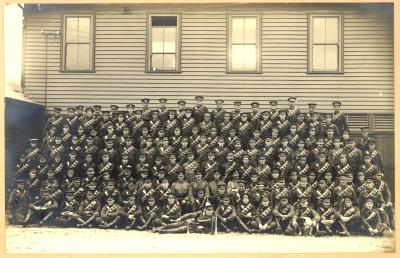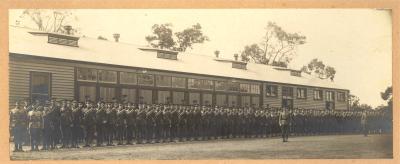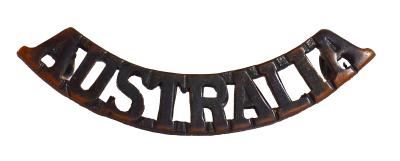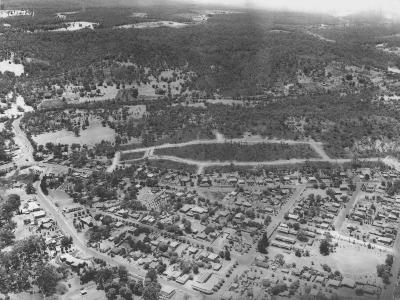FRUIT CRATE - RUNNYMEDE
1895 - 1979Rectangular wooden slated box. Solid base and both ends with 3 slats on each side and text stencilled on one end.
Runnymede Orchard exported a great deal of fruit (with most international exports going to Singapore) - approximately 500 cases of fruit per week.Different cases were used for different fruits (necessary because, unlike most orchards in the area, Runnymede grew a wide variety of fruits, rather than sticking to one or two): 'flats' were used for plums, apricots etc., and 'dumps' were used for pears, apples etc.These cases were regulated by government legislation, and in the case of export fruit, also had to meet international requirements.There was a large packing shed on Runnymede, which had a mechanical grader by the 1950s. This was used to sort the fruit according to size, prior to packing. Before the grader, all fruit was hand packed. Originally, all cases used at Runnymede were made from jarrah and other hardwood, but pine was used increasingly from the 1950s (with jarrah still being used for export fruit). Fruit cases were made in the back of the packing shed: a timber bench with slots held the end boards of the case in place, side panels were arranged over it, and then nailed into place. This was mainly done by the man who was described as the best case-maker - either Cliff or Ken Harris. Runnymede's jarrah boxes were mainly produced by Sonego's on River Road, Kelmscott.
Markets gardens and orchards played a key role in developing the district in the 1890s and through to the 1940s. The industry brought many new families into the district who cleared land and established their orchards or market gardens. Since the 1960s the industry has come under increasing pressure from agricultural land being turned into urban housing developments, children not carrying on family orchards and the cost of running a market garden and orchard which can be very labour intensive industries. Runnymede Orchard suffered from this and was sold by the family in 1967 and not long after subdivided into small lots.
As these pressures cause more orchards an market gardens to close this item and other items relating to the industry will change from representing an active and prominent industry to a past industry.
Details
Details
Text on end [B.V.CROSS & SONS / RUNNYMEDE / BEDFORDALE]
This object is part of a collection that represents the important role Agricultural and Horticultural Societies have played in the supporting, promotion and development of rural industries in the City of Armadale as well as providing significant social events that brought large parts of the community together to celebrate the achievements of local families, orchards, farmers and horticultural. Agricultural and horticultural societies have operated in the City of Armadale since 1897 when the Kelmscott Agricultural Society was formed.
City of Armadale - History House
City of Armadale - History House
Other items from City of Armadale - History House
- PHOTOGRAPH - WWI SOLDIERS
- PHOTOGRAPH - REGIMENT PHOTO WWI
- BADGE, MILITARY - AUSTRALIAN ARMY
- MEMORIAL PHOTO & MEDALS - GERRY W RUSSELL
- POSTCARDS -YPRES FRANCE WORLD WAR ONE
- POSTCARDS -YPRES FRANCE WORLD WAR ONE
- POSTCARDS -YPRES FRANCE WORLD WAR ONE
- CHAIR - ARMADALE KELMSCOTT ROADS BOARD
- PHOTOGRAPH, LANDSCAPE - ARMADALE TOWN CENTRE
- POSTCARDS - YPRES FRANCE WORLD WAR ONE
- POSTCARDS - YPRES FRANCE WORLD WAR ONE
- POSTCARDS - YPRES FRANCE WORLD WAR ONE




